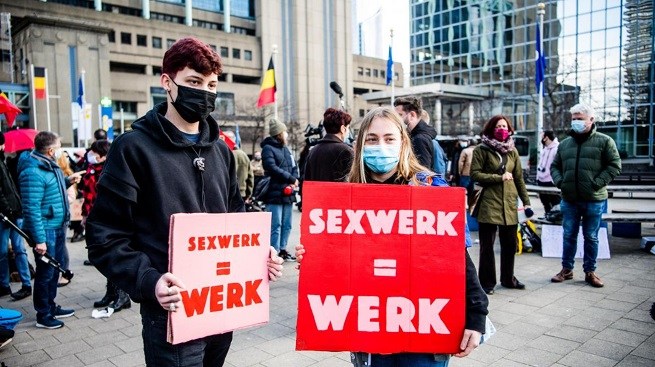After decades of confusing rules and hypocritical policy, Belgium is finally regulating sex work by removing prostitution from the criminal law. Maïthé Chini speaks to Belgium’s Justice Minister, the director of the sex workers union, and a representative of migrant women, as she looks at what it means for the world’s oldest profession
In Belgium, as almost anywhere around the world, sex workers face stigma and prosecution. But they have become increasingly vocal in recent years, as they have demanded basic legal rights. Now politicians are starting to listen.
Belgium is joining a growing number of states by decriminalising sex work and regulating the industry. In April 2021, Justice Minister Vincent Van Quickenborne set the wheels in motion by announcing that he wanted to decriminalise sex work.
It is a shift that implicitly accepts that sex work should not be abolished, and that sex workers can decide for themselves how they do their job. "It exists anyway. We know that," Van Quickenborne tells The Brussels Times. "The question is: who will be worse off if we take this step?"
Under current regulation, sex work is allowed, but third parties involved with sex workers are committing a crime. The law aims to target pimps, but it also impacts other people involved with sex workers, from bookkeepers and web designers to drivers, landlords and even banks. "All of them are punishable," Van Quickenborne says. "We are removing all that. This way, someone who does sex work – if they are of age and do it voluntarily – no longer has to worry about it.”
Van Quickenborne opted to decriminalise rather than legalise sex work. The distinction means that sex workers do not need to meet tough legal conditions to effectively engage in prostitution. In the Netherlands, where a legal framework was in place, these demands led to significant clandestine sex work.
Van Quickenborne worked with the Belgian sex worker union UTSOPI to follow the example of New Zealand, which decriminalised prostitution in the early 2000s. Specifically, it means taking Articles 380, 380bis and 380ter out of Belgium's Penal Code, which punish "those who cooperate in fornication and prostitution.”
While it feels counterintuitive, decriminalisation is much better than outright legalisation, UTSOPI Director Maxime Maes says, as it adapts the system to the real needs of sex workers. "We should find a way to allow sex workers to choose their practices and their clients," he says. "That’s the core of consent."
But it is not as simple, for example, as just adapting the contract of someone working in a massage salon. "Masseuses cannot choose their clients and they cannot choose their practices, because they work as a masseur and have to do their job," Maes says. "Sex work is work, of course. But it is specific work, with some particularities that we have to take into consideration.”
Beating the pimps
UTSOPI says sex workers should be free to practice the way they want to. "At the same time, it is important to really keep an eye on pimping and human trafficking," Maes says.

Brussels sex workers protest, March 2021. Credit: UTSOPI
That is why, as Van Quickenborne points out, his proposal explicitly includes the provision 'abuse of prostitution,’ to combat pimping. "We have clarified everything that was in the grey zone, and brought it to the ’white zone,’ while also making the area of 'prohibited acts' clearer," the minister says.
"There are, of course, the provisions on trafficking in human beings, which in itself contains criminal offences, but 'abuse of prostitution' specifically means that, even with less evidence, we can still criminalise people," he explains.
Penalties include prison sentences between one and five years, as well as fines from €500 to €25,000. Abuses include pressuring a sex worker and determining how many clients they must see each day or saying that all sexual acts must be allowed and not leaving that choice up to the worker.
It also covers someone renting out rooms at exorbitant prices, or someone inciting through advertising, as well as sugar daddies. "All the abuse surrounding prostitution and sex work is in it, because we now want to prosecute this very explicitly," Van Quickenborne says. "Where, first, everything was in a zone of tolerance, and what was or was not allowed depended on the place and the prosecutor, we are now drawing very clear lines.”
New Zealand vs Nordic models
Van Quickenborne contrasts the Belgian approach with other countries, such as Sweden, which still want to remove prostitution entirely. "That is not our position, because it cannot be eradicated,” he says.
Many feminist organisations, such as the European Network of Migrant Women (ENoMW), argue that the Nordic model used in Sweden is the right way to end prostitution: criminalise buyers and partially decriminalise workers.
“The approach that Belgium is taking now, saying ‘well this is not going to go away’ is just not a way of thinking that we can afford,” says Anna Zobnina, ENoMW’s Strategy & Policy Coordinator. “If we always thought like that, women would still not be able to vote. You can call it idealist, but we keep our standards high. We want the full package of human rights for women.”
Sex workers reject this Nordic model as it deprives them of income. “But for us, the solution is to have a legal system in which no man has the right to purchase sexual access,” Zobnina says. “No one is arguing that the Nordic model is an ideal and immediate solution. We are not stupid. The ownership of women by men is a very real historic fact. In this context of tens of thousands of years of patriarchy, we are not that naive to believe prostitution will just disappear if we introduce this model tomorrow.”
However, it would be “a very necessary, first legal step” that would enable Belgium to take all other steps, Zobnina says. “Every law needs to be correctly implemented, which requires political will and resources, funding and training,” she says. “It is not just about punishing buyers, but also about providing exit services for women.”
Zobnina says the Nordic model requires political will, funding, education and awareness-raising, as well as support to the women in prostitution. The aim is not to eradicate sex work, but to safeguard women, she says, adding that the results in Sweden show that it works. “We are coming from a feminist and human rights perspective. We are trying to give everybody – but specifically migrant and refugee women, in our case – the right to live in a society without facing the risk of sexual exploitation and sexual degradation.”
Van Quickenborne, however, made the conscious decision to follow the New Zealand model instead, saying that many people in sex work do it voluntarily. "Why do we have to criminalise those people? Why should we say that these people are committing criminal acts? To me, that seems particularly patronising and hypocritical," he says.
Destigmatising the job
While his proposal - which will also help to destigmatise the job - received many positive reactions from the sector, Van Quickenborne is also aware of the concern of organisations like ENoMW, as well as others. When the parliament returns to text in autumn, those organisations will also be heard, he says. "However, the position that the government has taken is a very firm, clear one, and we are not going to deviate from it now."
Belgium’s sex workers themselves, meanwhile, are hoping that the law can be implemented as soon as possible. “There are many sex workers waiting for their rights,” Maes says, adding that the sector is still feeling the damage done by the prostitution ban over the past year and a half during the pandemic. “The coronavirus crisis really made it clear how bad the lack of statute and recognition was for sex workers. I don’t know if we will succeed in helping everyone, but this is definitely the beginning of something,” Maes says.
Another benefit of regularisation, UTSOPI says, is that it should bring more recognition for the job. For example, sex work was not considered in any of the government’s press conferences about the coronavirus measures. “They never, ever talked about sex work,” Maes says. “Not even when everyone was talking about non-essential contact professions.”
The fact that the sector was never explicitly told to stop working caused confusion for everyone involved. “Over the last few months, it happened a few times that police officers called me, as the coordinator at UTSOPI, to ask me if sex work was allowed at the time or not,” Maes says. “It was just a big mess. The police should not be calling the workers with that question. If anything, it should be the opposite.
By contrast, in the Netherlands, the government included sex work in their spring 2020 plans, saying it would probably be the last sector to be allowed to restart. “That was not great news, but at least they were taken into consideration, which is exactly what did not happen here,” Maes says.
That, in essence, is what sex workers are asking for: to not be ignored. “I ask them not to make decisions from a moralistic, ideological point of view, but to be pragmatic,” Maes says. “I am not asking them to think about sex work, but I am asking them to think about sex workers. We are here, regardless of their moral judgement.”
By Maïthé Chini

